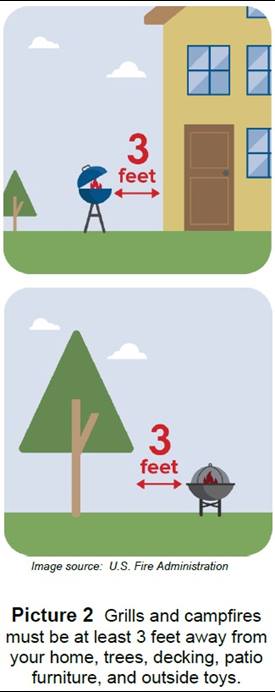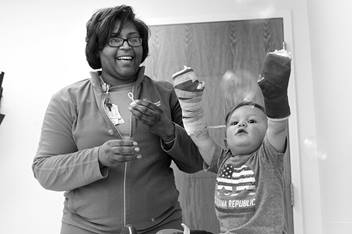Burn Prevention: Preschool and School-Age
Burn Program
Looking for services or physicians who can help treat this condition?

Burn injuries can be serious at any age. Preschoolers and school-age children are at greater risk of burn injuries because they’re curious and like to explore.
If your child has been burned, apply cool water to the area for 20 minutes. Do not use ice or ice water on the burn. Keep the rest of your child’s body warm while doing this.
Hot Water Burns
- Set the temperature on your hot water tank below 120° Fahrenheit (F) or 48.9°
Celsius (C). - Teach your child to turn on cold water first, then slowly add hot water.
- Always test the temperature of your child’s bath or shower water before it touches their skin. It should feel warm, not hot, to the touch.
- Never leave your child alone in the bathroom while preparing or taking a bath.
- Do not bathe your baby in a sink while the water is running.
Kitchen or Cooking Accidents
- Do not leave your child alone in the kitchen. Supervise them if they’re using a stove, oven, or hot plate alone.
- Turn the handles of pots and pans towards the back of the stove (Picture 1).
- Always create a safe zone by keeping your child 3 feet away from the stove while it’s on.

- Be sure your child does not wear loose clothing around someone who is cooking or while they’re cooking.
- Put away all appliance cords. They can cause severe injuries if they’re pulled, bitten, or cut.
- To avoid spills, have your child sit at a table to eat.
- Be careful with food containers that can go in the microwave. The packaging can get hot, leading to drops or spills.
- Teach your child to use oven mitts when taking food out of a microwave. If using a cover, they can lift it safely and slowly with a utensil. The steam under the cover can cause burns.
- Fill food bowls or containers less than halfway full when putting them in the microwave. Food or liquid can spill and cause burns.
Flames

- Teach your child that it’s not safe to play with fire.
- Have a smoke detector in each room in your home. Replace the batteries every 6 months. If your smoke detectors are over 10 years old, replace them with new ones.
- Always keep your child away from fireplaces, space heaters, and stoves. The glass window in front of a gas fireplace or stove gets very hot. Teach your child not to touch glass or the stove during or after a fire.
- Do not leave your child alone with burning candles or wax and tart warmers.
- Do not leave your child alone with sparklers. They can create intense heat, which can lead to a severe burn injury.
- Always keep a fire extinguisher close while grilling, around a campfire, and in the kitchen.
- Never use lighter fluid on a burning fire or hot coals. Supervise and teach your child to stay away from outside grills and fires. Do not allow them to run near campfires. To avoid serious burns, have a 3-foot safe zone around grills and campfires (Picture 2).
Sunburn
- Sunburns happen mostly between 10 a.m. and 2 p.m. Have your child wear a hat to protect their skin from sunburns.
- Use sunscreen with a sun protection factor (SPF) over 30 on your child before they go outside. Reapply if their skin gets wet while swimming or using a sprinkler.
- Your child can even get a sunburn on cloudy day. They can also get a sunburn while in the shade if the sun is reflecting off a body of water.
Electricity
- Teach your child not to climb towers or trees near power lines or power line poles.
- Teach your child not to touch a power line that has fallen.
- Water carries and spreads electricity. Teach your child not to use electrical appliances in or near water. This includes things like hair dryers, curling irons, and extension cords.
- Keep your fuse box closed and locked.
- Always supervise your child if they’re playing with a kite or model airplane outside. The object could get caught in power lines.
Chemicals
- Keep candles, matches, lighters, gasoline, kerosene, gunpowder, spray cans, paint, and paint thinner out of the reach of children and pets.
- Lock up all cleaning products and chemicals. These are highly flammable. That means they can cause a burn injury and possibly start a fire easily.
- Keep (800) 222-1222, the Poison Control Center’s phone number, by or in all phones in case of an emergency. They will tell you what to do in case of a chemical exposure. Have the product container nearby or know the name of the product.
Internet and Social Media Warning
If your child has access to the internet and/or social media, always check what they’re watching and reading. There are many videos and “challenges” on the internet. Some of
these may include the use of fire. Make sure your child does not take part in these challenges or make any videos using fire or fire-starting items.
HH-IV-18 • ©1986, revised 2023 • Nationwide Children's Hospital

